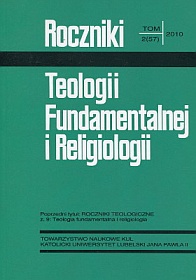„Przyjmij twój sukces!”. Atrakcyjność neopentekostalnego wymiaru chrześcijaństwa w Ghanie
Abstrakt
It is a fact that Neopentecostal version of Christianity, i.e. the so-called third wave of Pentecostal revival developing form the 1970s, receives quite a lot of attention in Ghana (and not only there). To a large extent, its attractiveness is due to such treatment of indigenous key worries of the Ghanaians (health and prosperity) that many perceive as Christian.
The article presents an outline of the religious context of contemporary Ghana in which the indigenous worldview has been creatively remodelled in interaction with Christianity. The Neopentecostal version of this reformulation receives the main attention in the article. Examples are drawn from the teachings and practice of two oldest Ghanaian Neopentecostal groups – Christian Action Faith Ministries International led by Nicholas Duncan-Williams and International Central Gospel Church led by Mensa Otabil.
The article also examines the problem of the effects of Neopentecostal teaching concentrated on the prosperity gospel. Though full effects are still to be seen and assessed the author tends to agree with those who, at present, see that the prosperity gospel leads quite a lot of Ghanaian Christians (many in an unconscious way) into a form of escapism (a flee from real problems into a world of dreams, expectations and faith).
Bibliografia
Asamoah - Gyadu K.: African Charismatics. Current Developments within Independent Indigenous Pentecostalism in Ghana. Leiden: Brill 2005.
Asamoah - Gyadu K.: Anointing Through the Screen. Neo-Pentecostalism and Televised Christianity in Ghana. „Studies in World Christianity” 11:2005 nr 1 s. 9-28.
Asamoah - Gyadu K.: Conquering Satan, Demons, Principalities, and Powers: Ghanaian Traditional and Christian Perspective on Religion, Evil, and Deliverance. W: N. van Doorn-Harder, L. Minnema (eds.). Coping with Evil in Religion and Culture: Case Studies. Amsterdam: Rodogi 2008 s.85-104.
Coleman S.: The Globalisation of Charismatic Christianity: Spreading the Gospel of Prosperity. Cambridge: Cambridge University Press 2000.
Darkwah A. K.: Aid or Hindrance? Faith Gospel Theology and Ghana's Incorporation into the Global Economy. „Ghana Studies” 4:2001 s. 7-29.
Gifford P.: African Christianity. Its Public Role. London: Hurst & Company 1998.
Gifford P.: Ghana's New Christianity. Pentecostalism in a Globalising African Economy. London: Hurst & Company 2004.
Gray R.: Black Christians and White Missionaries. New Haven 1990.
Grodź S.: Chrystologia afrykańska w rodzimym kontekście kulturowym. Lublin: TN KUL 2005.
Horn J. N.: From Rags to Riches: An Analysis of the Faith Movement and Its Relations to the Classical Pentecostal Movement. Pretoria 1989.
Jenkins P.: Chrześcijaństwo przyszłości. Nadejście globalnej Christianitas. Warszawa: Verbinum 2009.
Kalu O.: `Globecalization' and Religion. The Pentecostal Model in Contemporary Africa. W: J. Cox, G. ter Haar (eds.). Uniquely African? Trenton, NJ 2003 s. 215-240.
Meyer B.: Translating the Devil. Religion and Modernity among the Ewe in Ghana. Trenton, NJ: Africa World Press 1999.
Omenyo C.: Pentecost Outside Pentecostalism. Zoetermeer: Boekencentrum 2006.
Pawlik J. J.: Zaradzić nieszczęściu. Rytuały kryzysowe u ludu Basari z Togo. Olsztyn: Studio Poligrafii Komputerowej „SQL” 2006.
Robbins J.: The Globalization of Pentecostal and Charismatic Christianity. „Annual Review of Anthropology” 33:2004 s. 119-123.
Ukah A. F.-K.: „Those Who Trade With God Never Lose”: The Economics of Pentecostal Activism in Nigeria. W: T. Falola (ed.). Christianity and Social Change in Africa. Essays in Honor of J. D. Y. Peel. Durham, NC: Carolina Academic Press 2005 s. 253-274.
Williamson S. G.: Akan Religion and the Christian Faith. A Comparative Study of Two Religions. Accra: Ghana University Press 1965.
Włoch W.: Zielonoświątkowy ruch. W: T. Gadacz, J. Milerski (red.). Religia. Encyklopedia PWN. T. 9. Warszawa: PWN 2003 s. 483-486.
Copyright (c) 2010 Roczniki Teologii Fundamentalnej i Religiologii

Utwór dostępny jest na licencji Creative Commons Uznanie autorstwa – Użycie niekomercyjne – Bez utworów zależnych 4.0 Międzynarodowe.

